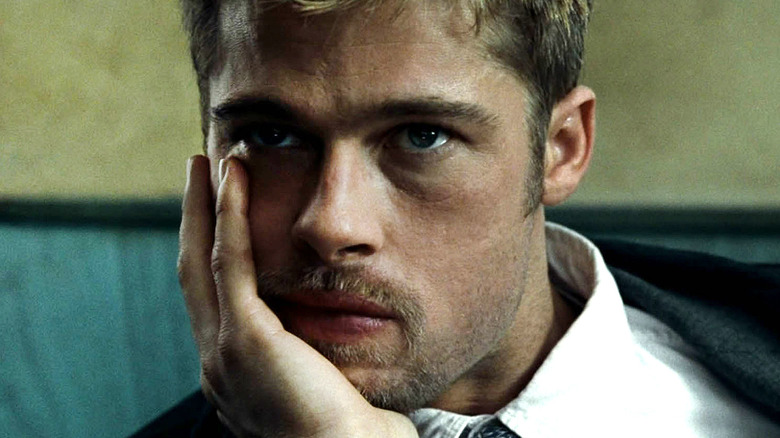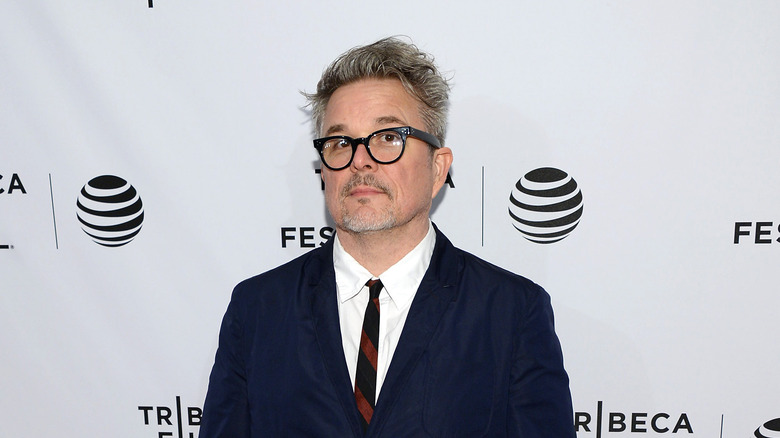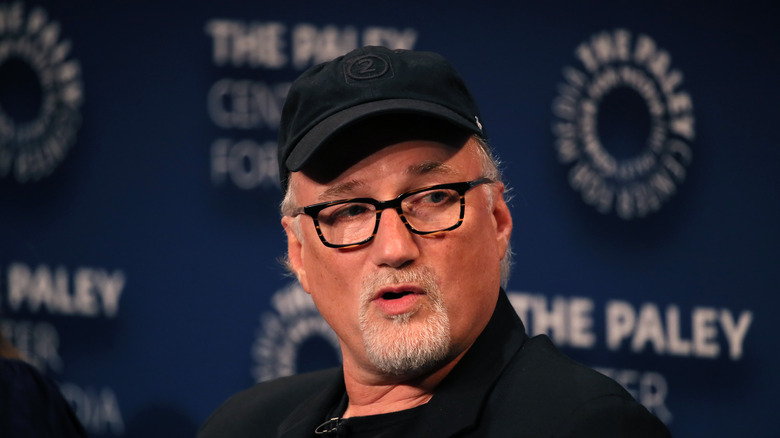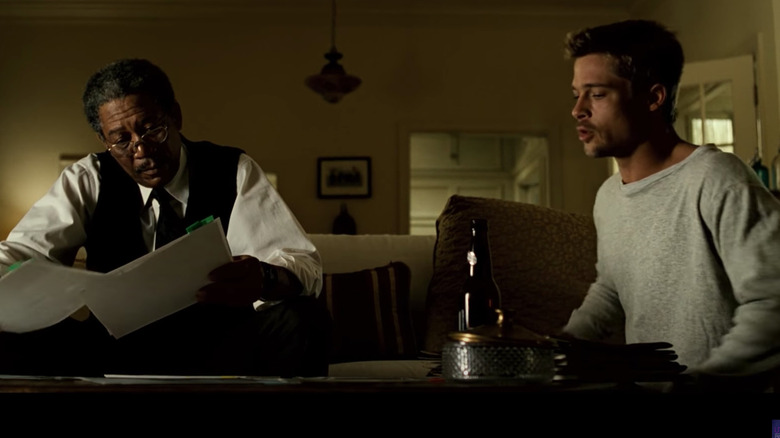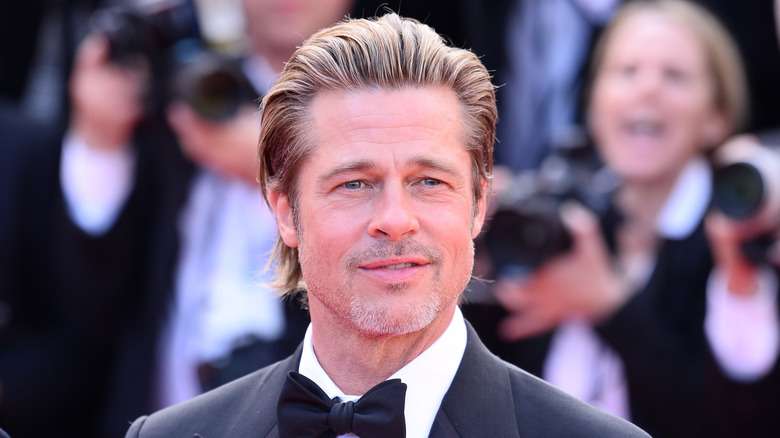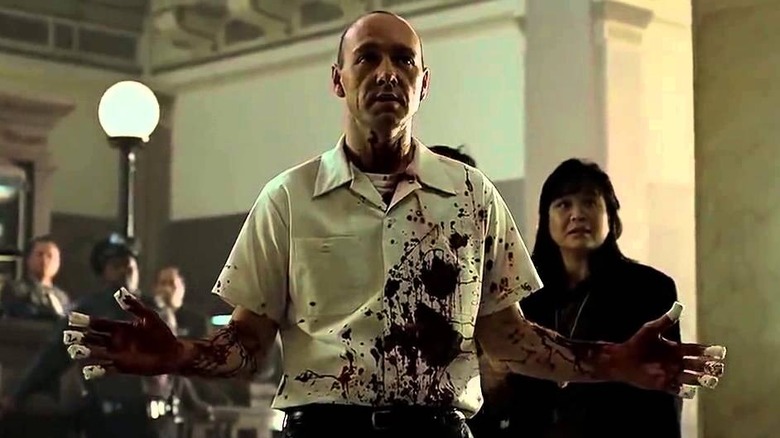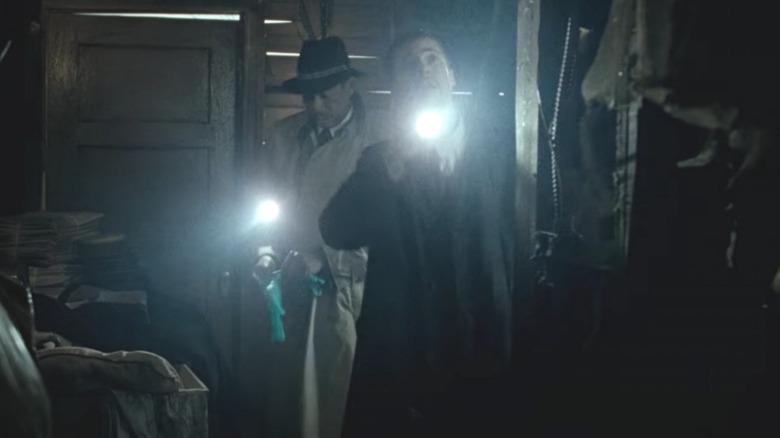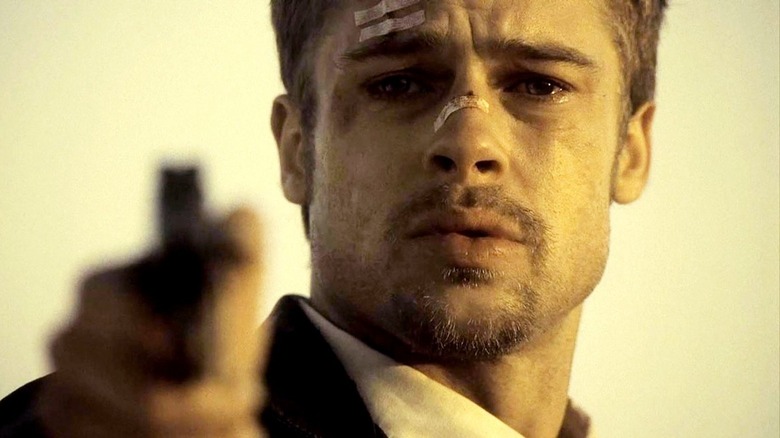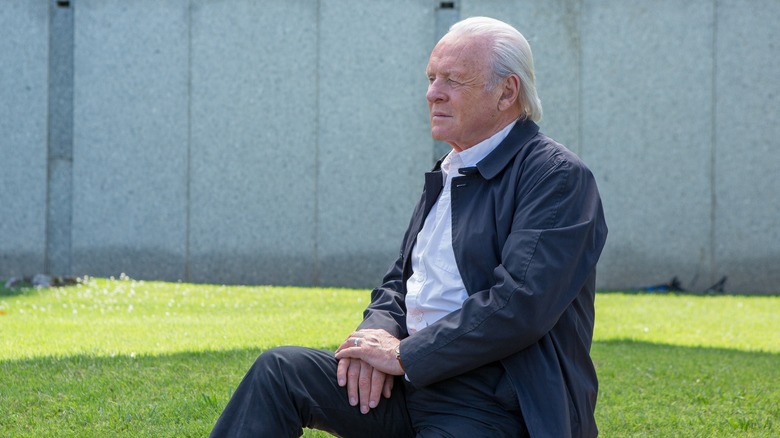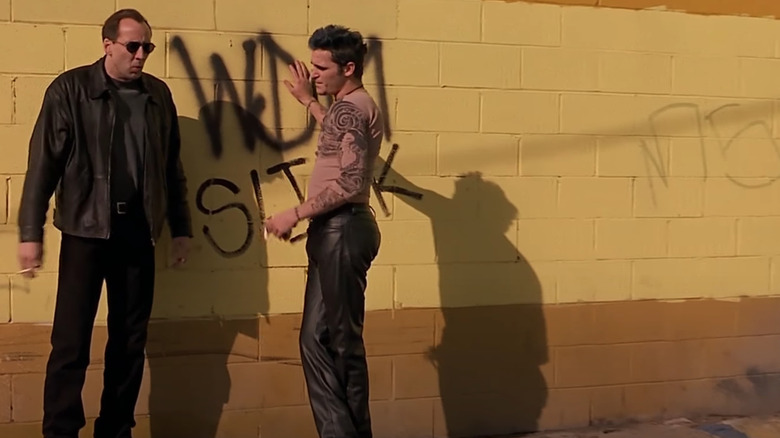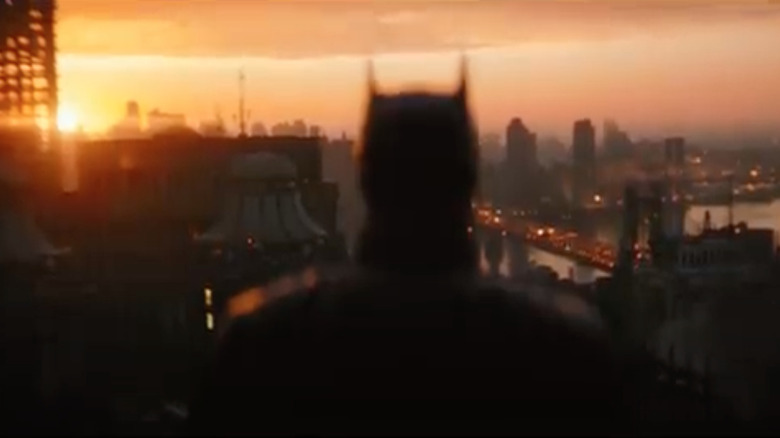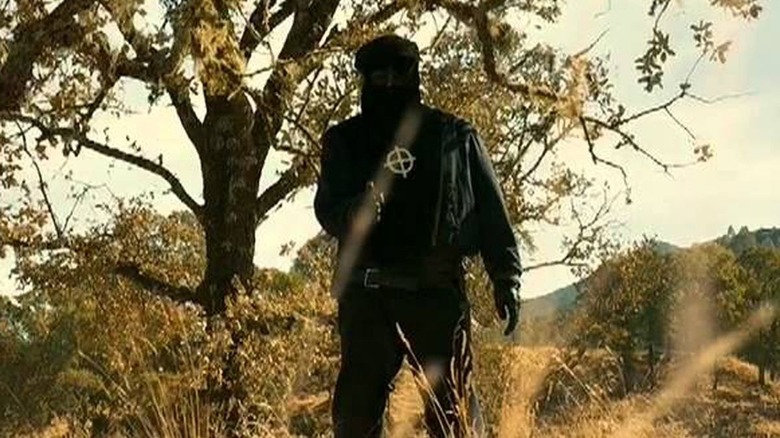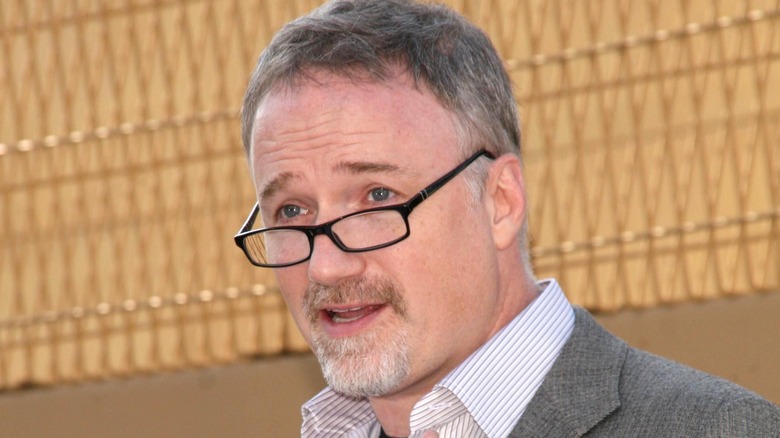The Untold Truth Of Seven
We may receive a commission on purchases made from links.
Written by a former employee of Tower Records, and helmed by a video director whose feature career was floundering, "Seven" turned out to be one of the best and most devastating movies of the '90's.
Best known to many as the movie that ends with a head in the box, "Seven" offers far more than gore and serial killer depravity. It's a smart, well-crafted thriller where Andrew Kevin Walker's script and director David Fincher's filmmaking mastery were the perfect match for each other, establishing them as an A-list director and hot screenwriter respectively. "Seven" also had great acting chemistry with Morgan Freeman as the burned-out, world-weary police veteran, Brad Pitt as the new hotshot detective eager to prove himself, and Gwyneth Paltrow as Pitt's doomed wife.
"Seven" is still remembered and revered today because it's a tough and uncompromising film, much like the dark, gritty thrillers of the '70's ("Taxi Driver" comes to mind). Not to mention that its infamous ending still has the power to devastate audiences to this day. But there's still a lot you may not know about the film, which had a hard road from its lengthy development process to the battle over its controversial ending. Here's the untold truth of "Seven."
The writer was convinced it wouldn't sell
Andrew Kevin Walker, who wrote "Seven," moved from his native Pennsylvania to New York after graduating college. He hated living there, and his misery was one of the driving factors in writing "Seven" (via Cinefantastique).
Walker knew the script was dark and was convinced that it wouldn't sell (via Uproxx). This was fine with Walker because he could use the script as a writing sample to get work. Some of his earliest screenwriting jobs included an early draft of "X-Men," an adaptation of the Dean Koontz best-seller "Hideaway," and "Sleepy Hollow," which was eventually directed by Tim Burton.
It ultimately took five years for "Seven" to get made. The first time the script went out everyone passed on it, then it finally landed at a tiny independent company, Penta Films. When that deal fell apart, the film wound up at New Line. As Walker said in the published edition of the script, "New Line is a great place for movies that are a little off the beaten track."
Walker was very happy with the resulting film, and found a kindred spirit in Fincher as a director. Fincher even gave Walker a tiny cameo in the movie: he's the dead guy lying on the floor in his underwear in the first crime scene Morgan Freeman investigates before the opening credits.
Seven saved David Fincher's career
Long before he became an A-list filmmaker, David Fincher was one of the hottest video directors in the business. Some of his best-known videos include Madonna's "Express Yourself," Aerosmith's "Janie's Got a Gun," and Don Henley's "The End of the Innocence," just to name a few.
But his first film, "Alien 3," was a debacle. According to Esquire, 27-year-old Fincher was given $60 million – the most money ever allotted for a directorial debut — to make the long-awaited follow-up to "Aliens" and essentially failed. There was no script and Fincher clashed repeatedly with the producers. He had held out five years to make his first feature, and after the fact, he recalled, "No one hated ['Alien 3'] more than me; to this day, no one hates it more than me."
Fincher's feature film career, however, was saved by Michael DeLuca, then an executive at New Line. Even though Fincher's name was mud after "Alien 3," DeLuca still thought he could make a great movie. As DeLuca recalled, "I loved his videos. He pitched a vison for 'Seven' that was so detailed and articulate, you just knew what the movie was going to be."
"Seven" made over $300 million worldwide, and Fincher went on to direct "Fight Club," "Panic Room," "Zodiac," "The Social Network," "The GIrl With the Dragon Tattoo," and "Gone GIrl," among others.
The first draft of the script got filmed by mistake
One "Seven" got sold, it went through a number of rewrites that softened the story. One of the biggest sticking points of course was the climactic "head in the box" scene, and it was originally eliminated (via Uproxx) after Walker turned in his first draft.
But Fincher was sent the first draft by mistake, and as he read it, he was morbidly intrigued. At first he thought it was just going to be a buddy cop movie, but it turned into something much deeper and disturbing. "All of a sudden it took this turn," he told Empire (via Cinephilia Beyond). "And I found myself getting more and more trapped in this kind of evil, and although I felt uncomfortable being there, I had to keep going."
Finally Fincher asked, "Are they going to make this? There's this head in the box at the end, it's just amazing." When they sent him the watered-down draft, Fincher responded in no uncertain terms that he wanted to film the original ending.
As De Luca recalled (via Deadline), "There was a draft that had a softer ending without the head in the box, but everyone, from David to [New Line founder] Bob Shaye on down, felt the ending made it a provocative water cooler movie."
Brad Pitt's deal stated that the ending couldn't be changed
When Brad Pitt signed on to star in "Seven," he wanted the film's integrity to remain intact, so he specifically had it put in his deal that the ending couldn't be changed.
As Pitt recalled (Via Entertainment Weekly), "I said, 'I will do it on one condition — the head stays in the box. Put it in the contract that the head stays in the box.'"
Pitt also insisted that he be the one to kill John Doe at the end. (In one version of the ending, Somerset kills John Doe.) "He's got to shoot the killer in the end," Pitt continued. "He doesn't do the 'right' thing, he does the thing of passion."
The studio had a problem with this because they believed Pitt would be more heroic if he didn't kill Doe. One of the alternative endings the studio proposed would have been John Doe killing Pitt's beloved dog, with its remains winding up in the box instead of Paltrow's head, but producer Arnold Kopelson told EW separately that he didn't recall that being up for serious consideration.
Kevin Spacey is uncredited until the end
At the time that "Seven" was released, Kevin Spacey was best known as a character actor, but he wasn't a movie star yet. This would change several years later with the success of "American Beauty," but before that, you may have seen him in lesser-known works like the crime series "Wiseguy," or in the Hollywood satire "Swimming with Sharks."
So even though Spacey was not a household name yet, he insisted on not being credited in "Seven" until the end of the film. His reasoning was that if you knew who he was, you'd probably guess he was the killer before he showed up.
As Spacey explained (via Games Radar), "If I'm the third-billed actor in a movie where the top two billings are trying to find somebody and they don't find that somebody until the last reel, then it's obvious who that somebody is ... I felt very strongly that it was the right thing to do for the movie."
Funnily enough, Spacey played two evil geniuses back-to-back. A month before the release of "Seven," he played Keyser Soze in "The Usual Suspects," another '90's masterpiece with a brilliant twist ending.
Seven is not as bloody as you think
To a lot of viewers, "Seven" is a bloody, disturbing film, but like the original "The Texas Chain Saw Massacre," it's not as gory as you think. In fact, you never even see the results of one of the worst killings in the film, the "Lust" murder.
As Richard Francis-Bruce, the editor of "Seven," told this writer in an interview, Fincher informed him in the cutting room that he wanted "just glimpses of things." In fact, some viewers swore (via Esquire) that you saw the head in the box at the end of the film, but Fincher never showed it. (Some viewers also swear you see the son of Satan at the end of "Rosemary's Baby," but the actual baby is never shown.) The death of John Doe is also the only murder that's shown onscreen; the audience usually sees the aftermath of his grisly, elaborate killings.
As Roger Ebert wrote in his review of "Seven," "Fincher shows us enough to disgust us, and cuts away."
A test screening for the movie went horribly
Some movies are just not going to test well with audiences recruited at a mall, and "Seven" was one of them. When "Seven" was test-screened to an unsuspecting audience, it went very badly, especially when the head in the box showed up.
The invites to the screening advertised the movie as the new film from Brad Pitt of "Legends of the Fall," and Morgan Freeman of "Driving Miss Daisy," which did not give the audience any indication of what they were about to experience. "They couldn't have been more offended," he said (via Esquire). "You couldn't molest the audience more than to promise 'Legends of the Fall' and 'Driving Miss Daisy' then to unleash this on them."
As Pitt recalled on Mark Maron's "WTF Podcast" (via LRM Online), the audience slowly got up from their seats, silent, and left the theater shell-shocked. Pitt told Maron, "I remember just looking at Fincher and going, 'Oh my God, what the f*** did we do? What happened? I thought this s*** was great."
As Fincher recalled, a group of women angrily stormed out of the theater, one of them saying (via Daily Hind News), "The people who made this film should be killed."
The ridiculous idea of a sequel was proposed
Whenever a movie is a gigantic hit, the studio usually wants a sequel, and while people might have loved a sequel to "Animal House," "E.T.," and "GoodFellas," they fortunately remain singular, standalone films. While "Seven" is clearly a standalone movie as well, there was an idea for a sequel that thankfully went nowhere.
New Line Cinema went looking for a screenplay that could be reworked into a "Seven" sequel, with the thought of calling it "Eight" (or "Ei8ht"). So New Line thought of "Solace," a script written by Ted Griffin ("Ocean's Eleven") and Sean Bailey, as a suitable follow-up where a psychic is brought in to find a serial killer. The film was indeed made in 2015, but without any connection to 'Seven."
As anyone familiar with Fincher's m.o. could have guessed, he had zero interest in doing a sequel to "Seven." As the director said at a Q&A back in 2009 (via Cinemablend), "I would have less interest in that than I would in having cigarettes put out in my eyes."
8mm could have been a good follow-up to Seven
Two years after "Seven" came out and was a bonafide box office hit, Andrew Kevin Walker wrote and sold his next script, "8mm," to Columbia for nearly two million dollars, according to the Guardian.
In "8mm," a private investigator is contacted by a wealthy widow who finds a snuff film in her husband's vault. She wants the investigator to find out who the victim in the movie is and who made the film, so she can go to the police and make sure that the guilty are punished. The investigator has to travel through a dark labyrinth of underground pornography to get the answers, and he barely makes it out alive.
"8mm" could have been a very respectable follow-up to "Seven," if Columbia hadn't come up with the bright idea of hiring Joel Schumacher ("Batman and Robin") to direct. He was clearly the wrong person to make the film, and also clumsily rewrote the script, adding godawful dialogue and watering down what should have been a very disturbing thriller.
Walker walked away from the film and has refused to watch it, but with so many horror films being remade these days, it would be great if someone would go back to the original draft and remake the film as it was written on the page (you can read the first draft at Walker's official website).
Seven inspired many thrillers, including The Batman
"Seven" grossed over $300 million worldwide, so naturally there were films which came out that imitated it. But these were more audience-friendly, and did not feature anyone's head being delivered by UPS.
The most obvious would have to be "Kiss the Girls," which also included Morgan Freeman and even had a similar ad campaign. "Kiss the Girls" was adapted from the best-selling James Patterson novel. "Seven" also encouraged directors to make darker and tougher thrillers like "Gone Baby Gone" and "Prisoners."
More recently, "The Batman" — and its John Doe-like version of the Riddler — was clearly inspired by "Seven," which has pleased screenwriter Andrew Kevin Walker to no end. He told Yahoo, "I'm just incredibly grateful that people remain aware of 'Seven.' That's, in my opinion, all due to Fincher. Look at 'The Batman' ... so much of the homage they're paying to 'Seven' is through a Fincher prism, rightfully so."
Fincher directed two of the greatest serial killer movies ever
How many directors can say they directed two of the best serial killer films in the history of cinema? David Fincher can, because he not only helmed "Seven," but he also directed the 2007 modern masterpiece "Zodiac."
Growing up in northern California, Fincher knew about the Zodiac Killer as a kid. "It was really scary," he recalled (via Esquire). "He was the ultimate bogeyman." But the movie "Zodiac" is deceptive. It's not primarily about the killer, but about one man's obsession with getting to the bottom of the case and learning who the Zodiac Killer really is.
The film has great performances from Jake Gyllenhaal, Robert Downey Jr., Mark Ruffalo and Chloe Sevigny, proving that Fincher is also a terrific actor's director in addition to a master of unease. With "Zodiac," Fincher created a haunting, compelling crime thriller that isn't boring despite its lengthy running time (two hours and 37 minutes).
As Smash Cut Reviews raved, "'Zodiac' holds up better than ever 10 years later ... [it] has grown to be one of [Fincher's] best, if not one of the best cinematic offerings of the century."
Fincher and Walker have reunited for The Killer
"Seven" had the right chemistry between its screenplay and director, and many film geeks have since hoped that Fincher and Walker would one day work together again. That wish has come true with "The Killer," which currently doesn't have a release date, but is coming soon from Netflix.
"The Killer" stars Michael Fassbender and Tilda Swinton in an adaptation of a graphic novel about an assassin who is going through a mental crisis. As Netflix executive Scott Stuber told Indiewire, "I'm so excited about it. [Fassbender is] charming and great-looking and funny and all these things that you want him to have chances to show in film ... You see what David has done with talent throughout his career, and how he constantly elevates people to do their best work."
Stuber added that "The Killer" is "a really provocative and interesting movie." Here's hoping that it will have the same dark and wonderful kismet that Fincher and Walker had before when they made their first classic, "Seven."
